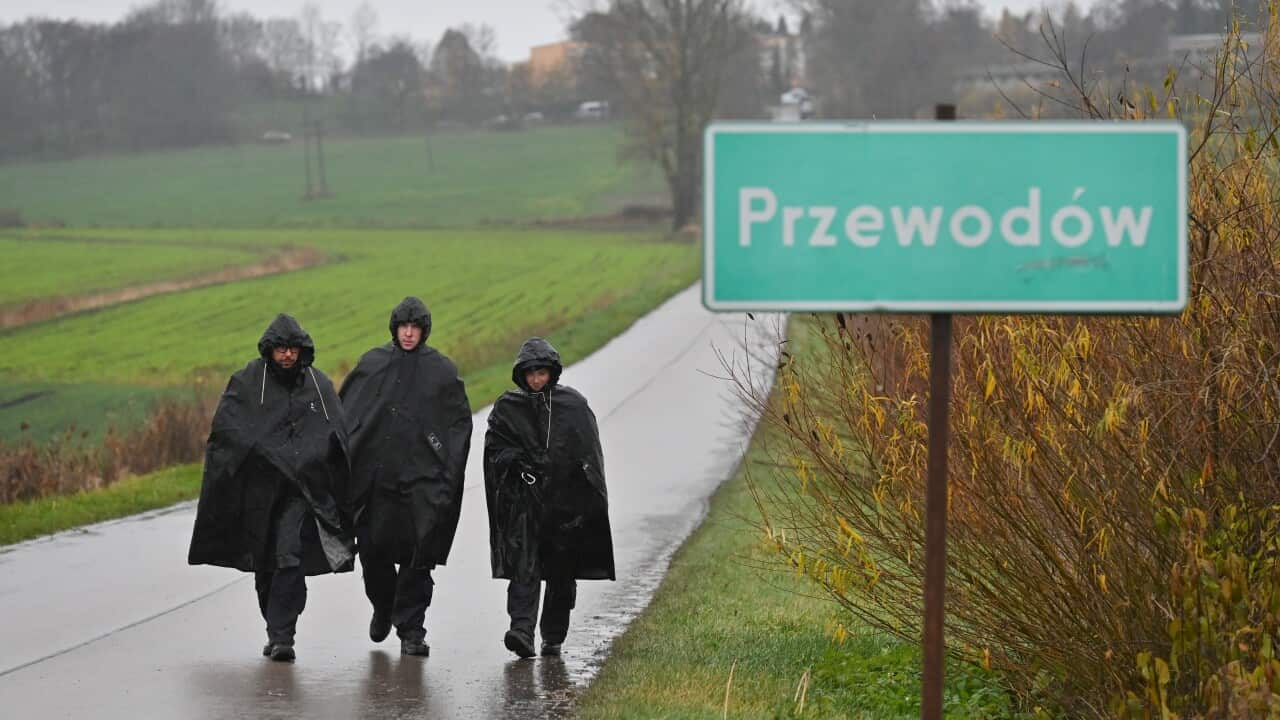KEY POINTS
- Two people were killed on Tuesday when a missile blast hit a Polish village, near the Ukrainian border.
- After intial reports Russia was behind the blast, NATO says it was probably caused by Ukraine's air defences.
- Ukraine maintains there is still a Russian 'trace' behind the attack.
A missile that hit Poland was probably a stray fired by Ukraine's air defences and not a Russian strike, Poland and NATO said on Wednesday, easing global concern that the war in Ukraine could spill across the border.
Nevertheless, NATO's chief said that Moscow, not Kyiv, was ultimately to blame for and launching the attack that triggered Ukrainian defences.
"This is not Ukraine's fault. Russia bears ultimate responsibility as it continues its illegal war against Ukraine," NATO Secretary-General Jens Stoltenberg told reporters in Brussels.

NATO Secretary-General Jens Stoltenberg did not announce any immediate NATO responses to the blast. Source: AAP / Olivier Hoslet
"From the information that we and our allies have, it was an S-300 rocket made in the Soviet Union, an old rocket and there is no evidence that it was launched by the Russian side," Polish President Andrzej Duda said. "It is highly probable that it was fired by Ukrainian anti-aircraft defence."
Mr Stoltenberg also said it was likely to have been a Ukrainian air defence missile. Earlier, US President Joe Biden had said the trajectories suggested the missile was unlikely to have been unleashed from Russia.
The incident occurred while Russia was firing scores of missiles at cities across Ukraine, in what Kyiv says was the most intense volley of such strikes of the nine-month war.

More than 10 Russian missiles hit critical infrastructure surrounding the western Ukrainian city of Lviv. Source: AAP / Pavlo Palamarchuk
The Russian Defence Ministry said none of its missiles had struck closer than 35 km from the Polish border, and that photos of the wreckage in Poland showed elements of a Ukrainian S-300 air defence missile.
The Kremlin said on Wednesday some countries had made "baseless statements" about the incident, after having accused Poland of an "absolutely hysterical" reaction on Tuesday, but that Washington had been comparatively restrained.
Hours after the incident, Ukrainian President Volodymyr Zelenskyy had blamed it on "Russian missile terror", and on Wednesday Kyiv did not appear ready to concede that its own missile was involved. Oleksiy Danilov, Secretary of Ukraine's National Security and Defence Council, said Kyiv wanted access to the site and still saw a Russian "trace" behind the attack.

Police officers secure access to the site of the explosion in the village of Przewodow, Poland. Source: Getty / Artur Widak
"Everyone has in the back of the head that we are right near the border and that an armed conflict with Russia would expose us directly," Grzegorz Drewnik, the mayor of Dolhobyczow, the municipality to which Przewodow belongs, told Reuters.
"If this is a mistake of the Ukrainians, there should be no major consequences, but I'm not an expert here."
Some Western leaders at a summit of the G20 in Indonesia suggested that whoever fired the missile, Russia and President Vladimir Putin would ultimately be held responsible for an incident arising from its invasion.

British Prime Minister Rishi Sunak arrives ahead of an emergency meeting of leaders at the G20 summit in Bali. Source: Getty / Leon Neal
G20 leaders issued a closing declaration saying "most members strongly condemned the war in Ukraine", although it acknowledged that "there were other views and different assessments of the situation and sanctions".
Russia is a member of the G20 and Ukraine is not, but Mr Zelenskyy addressed the summit by video link, while Putin stayed home.
Moscow launched Tuesday's wave of missile attacks , the only regional capital it had captured since the invasion.
The barrage echoed a pattern of Moscow lashing out with longer-range missile volleys after losses on the battlefield to a continuing Ukrainian counter-offensive in the east and south.

71-year-old Vasiliy Untura inspects a destroyed home in Posad-Pokrovske village, Kherson. Source: Getty / Metin Aktas
Tuesday's Russian missile flurry largely targeted Ukraine's energy grid, causing power blackouts in a number of cities, some far from front lines. Millions of people were deprived of electricity, according to the UN humanitarian office OCHA.
Rolling power outage schedules in the western Lviv region were being extended to cover all hours of the day, regional governor Maksym Kozytskyi wrote on Telegram on Wednesday.









